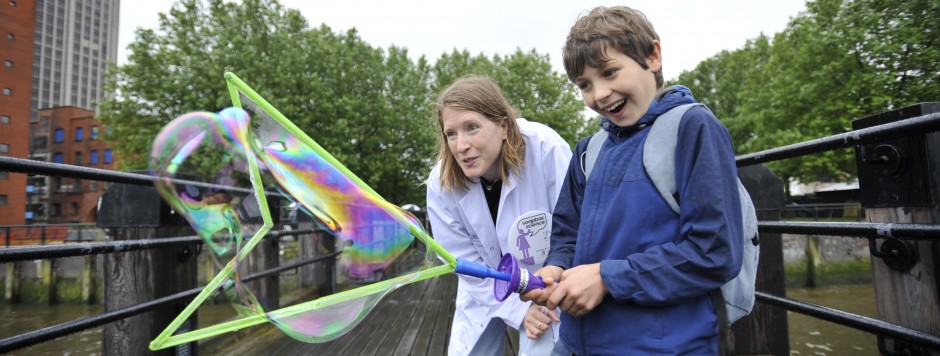 Siobhan Braybrook is a Career Development Fellow at The Sainsbury Laboratory, University of Cambridge. Her research aims to understand how patterns of growth emerge from biological systems by combining principals from biology, mathematics, physics and engineering. Here Siobhan tells us about working across the borders of different disciplines, and choosing the scary option! Siobhan will be talking about Moving without muscle – how plants dance in Cambridge Market Square at 12-3pm on 2nd July 2016. Come along to discover how shapes are grown (not made!) and movements generated (without muscles!) in these elegant and complex organisms.
Siobhan Braybrook is a Career Development Fellow at The Sainsbury Laboratory, University of Cambridge. Her research aims to understand how patterns of growth emerge from biological systems by combining principals from biology, mathematics, physics and engineering. Here Siobhan tells us about working across the borders of different disciplines, and choosing the scary option! Siobhan will be talking about Moving without muscle – how plants dance in Cambridge Market Square at 12-3pm on 2nd July 2016. Come along to discover how shapes are grown (not made!) and movements generated (without muscles!) in these elegant and complex organisms.
SS: Siobhan, how did you get to your current position?
SB: The Sainsbury Laboratory is a new research department at the University of Cambridge. I met the directors at a scientific meeting and became interested in this new place which focused its research in plant development. So I applied for an open Career Development Fellowship, was invited to interview, and subsequently was offered the position. Coincidentally, I was also awarded an HSFP long term fellowship to work in France. Starting my own group in Cambridge was scarier, and I make a point of doing the scarier thing; I find it pushes you outside of your comfort zone, which is where most growth occurs!
SS: What, or who, inspired you to get a career in science?
SB: I don’t remember a time when I wasn’t curious about the world around me. I suspect that my parents are largely at fault as they kept forcing me outside and pointing out amazing things! They raised me to feel empowered by discovery and they also encouraged me to be happy- scientific research makes me happy.
SS: What is the most fascinating aspect of your research/work?
SB: I am constantly renewed by the interdisciplinary nature of my work; by meeting with scientists from many disciplines I am always learning new ways to approach experiments and new ways of questioning the biological world. Disciplines are human constructions, so we can choose to extend beyond their borders.
SS: What attracted you to Soapbox Science in the first place?
Everyone can engage with science, absolutely everyone. It is not an Ivory Tower, it is the pursuit of understanding of our world – where we all live! One could be forgiven for assuming that science was the territory of socio-economically privileged cis-gendered white men if one examined the evidence, but hopefully we can recognize that trend is also a human construction. And if we made it, we can change it. Soapbox Science is one way we can effect change by increasing the visibility of women in science.
SS: Sum up in one word your expectations for the day – excitement? Fear? Thrill? Anticipation?
SB: Excited!
SS: If you could change one thing about the scientific culture right now, what would it be?
It is hard to be creative and adventurous in science when you are constantly being evaluated against metrics of ‘success’ (where your work is published is more important than what it is, how crazy!). I wish research was given a little bit more room to spread its wings- sometimes we will fall to earth, but sometimes we might fly and that is what we should be aiming for.
SS: What would be your top recommendation to a female PhD student considering pursuing a career in academia?
If you want it, go for it; you have to be actively engaged in your own future. Find the right mentor for you, follow your enthusiasm for projects, and don’t let anyone tell you that you can’t (including yourself!). It will be amazing, and sometime difficult, but you deserve to do what makes you happy.
